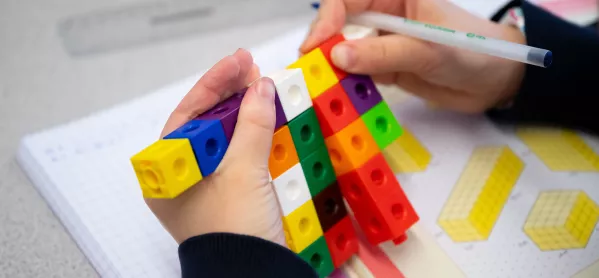‘Nearly half’ of schools use non-specialist maths teachers

Almost half of secondary schools are using non-specialist teachers for maths lessons, new research suggests.
Experts have warned that teacher shortages and the mitigations schools are forced to put in place to combat them - including the use of non-specialist teachers in certain subjects - “may be acting as a drag on system-wide improvement of pupil outcomes”.
This is “likely to have a negative impact on longer-term skill development and supply, particularly in Stem [science, technology, engineering and maths] subjects, and ultimately on long-term economic growth”, according to the study, conducted by the National Foundation for Educational Research (NFER) and funded by the Nuffield Foundation.
The study, which investigated the measures that school leaders have put in place to tackle difficulties in teacher recruitment, found that 45 per cent of school leaders reported high levels of non-specialists teaching some maths lessons.
Meanwhile, almost four in 10 (39 per cent) reported some physics lessons being taught by non-specialists, with 17 per cent saying some modern foreign languages (MFL) lessons were being taught by non-specialists in their schools.
- Teacher recruitment problems: Teacher vacancy adverts hit record high
- Revealed: Soaring teacher vacancies impact on schools
- Exclusive: Teacher vacancies rise by almost two-thirds in September
- Teacher training: DfE raises teacher training bursaries amid recruitment crisis
The report is based on surveys carried out in both the 2019-20 and 2020-21 academic years, receiving responses from 863 and 848 senior leaders respectively.
Teacher recruitment woes linked with Ofsted ratings
The report also says that a school’s Ofsted rating “clearly has a significant association with difficulty recruiting teachers”.
Experts add: “Challenges with teacher recruitment may also be having a disproportionate impact on schools with low Ofsted ratings, and school leaders’ efforts to improve outcomes.”
The research found that schools taking part in the surveys and rated “outstanding” were less likely to report finding teacher recruitment the most difficult, while schools that were rated “requires Improvement” or “inadequate” were more likely to report finding recruitment the most challenging.
It also found that schools with lower Ofsted ratings “reported more types of recruitment challenge than schools with higher ratings”.
And schools with lower Ofsted ratings also reported using non-specialists across maths, physics and MFL to a greater extent than schools with higher Ofsted ratings.
However, experts noted that there were “likely many factors that result in a school receiving a lower Ofsted rating, which may also be factors associated with finding recruitment more difficult”.
Disadvantage and the use of non-specialist teachers
The study found that a higher school disadvantage level was associated with the use of non-specialist teachers in physics and MFL, but not significantly for maths.
The report says that “the most disadvantaged schools involved in the research did report more types of recruitment challenge affecting their school than schools with fewer disadvantaged pupils”.
And primary and secondary schools with a higher proportion of pupils eligible for free school meals “reported that their school being in a deprived area and school reputation were significant challenges to recruitment”.
Meanwhile, researchers found that more than half (57 per cent) of secondary school leaders with the highest level of disadvantage in their school reported that at least some physics lessons were staffed by non-specialists, compared with 38 per cent for the lowest level of disadvantage.
And more than a quarter (28 per cent) of leaders in schools with the highest level of disadvantage reported that some MFL lessons were staffed by non-specialists, compared with 16 per cent for schools with the lowest level of disadvantage.
Call for ‘renewed focus’ on recruitment and retention
Jack Worth, NFER school workforce lead and co-author of the report, said the “growing recruitment and retention challenges in England are likely to be having negative impacts on pupils’ education and learning”.
He said that measures such as deploying non-specialist teachers or asking school leaders to take on more teaching “make school improvement harder right across the system”.
“We call on the government to place a renewed focus on improving teacher recruitment and retention, to ensure a sufficient supply of teachers and, in turn, support the improvement of pupil outcomes in schools throughout the education system,” he added.
And Josh Hillman, director of education at the Nuffield Foundation, said it was of ”great concern that the report’s findings highlight how recruitment challenges are leading to an increased use of non-specialist teachers, particularly in schools struggling to hire teaching staff, and in particular parts of the country”.
Writing in Tes today, Mr Worth said that while there was a “slight easing” of recruitment and retention challenges during the pandemic, “teacher supply is yet again a major issue for schools in England”.
Geoff Barton, general secretary of the Association of School and College Leaders, said the findings “underscore the scale of the recruitment and retention crisis in education”.
The Department for Education has been contacted for comment.
You need a Tes subscription to read this article
Subscribe now to read this article and get other subscriber-only content:
- Unlimited access to all Tes magazine content
- Exclusive subscriber-only stories
- Award-winning email newsletters
Already a subscriber? Log in
You need a subscription to read this article
Subscribe now to read this article and get other subscriber-only content, including:
- Unlimited access to all Tes magazine content
- Exclusive subscriber-only stories
- Award-winning email newsletters
topics in this article



